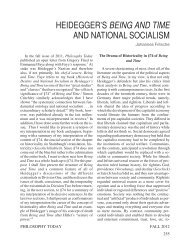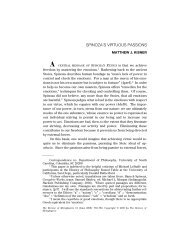Why Saying “I'm Sorry” Isn't Good Enough: The Ethics of Corporate ...
Why Saying “I'm Sorry” Isn't Good Enough: The Ethics of Corporate ...
Why Saying “I'm Sorry” Isn't Good Enough: The Ethics of Corporate ...
Create successful ePaper yourself
Turn your PDF publications into a flip-book with our unique Google optimized e-Paper software.
<strong>Ethics</strong> <strong>Corporate</strong> Apologies<br />
In some cases, a particular firm’s CEO role itself may be so contaminated by perceived<br />
past corporate wrongdoing that the current occupier <strong>of</strong> that role will have trouble<br />
convincing the public that he or she does have a just character. Japan’s TEPCO illustrates<br />
my concern. TEPCO had a history <strong>of</strong> not disclosing problems at its nuclear plants<br />
(Shirouzu et al, 2011). It has gone so far as to falsify plant records and to re-edit video as<br />
part <strong>of</strong> a cover-up (Mostrous et al, 2011). TEPCO did not transparently provide<br />
information about the steps it was taking to ensure that such ethical breaches would not<br />
occur in the future. Consequently, even prior to the 2011 Fukushima nuclear disaster, the<br />
Tokyo public doubted the honesty <strong>of</strong> TEPCO’s management (Whitaker, 2011). <strong>The</strong> CEO<br />
at the time <strong>of</strong> the disaster may have been trying to change the culture at the firm and<br />
prevent problems in the future, but the public’s suspicion <strong>of</strong> past TEPCO<br />
pronouncements and assurances led citizens to discount his recent apology regarding the<br />
radiation leaks at Fukushima (Harlan, 2011).<br />
In other words, the past behavior <strong>of</strong> both the individual CEO and his or her immediate<br />
predecessors are part <strong>of</strong> the context in which the apology is given and in which it seeks to<br />
establish its authenticity. <strong>The</strong> past behavior <strong>of</strong> both parties is interpreted as revelatory <strong>of</strong><br />
the CEO’s character, which in turn is thought to shape his or her intention. This context<br />
<strong>of</strong> inferred character, habits, and motivations conditions how the apology is heard and,<br />
consequently, the extent to which it is meaningful as an apology—i.e., the extent to<br />
which it functions to restore trust. If the inferred character <strong>of</strong> the CEO is not thought to be<br />
just, then any acceptance <strong>of</strong> wrongdoing may fail to foster and restore trust. To be<br />
deemed trustworthy, CEOs should do what they can to address past public perceptions <strong>of</strong><br />
28

















